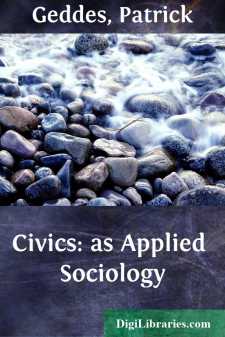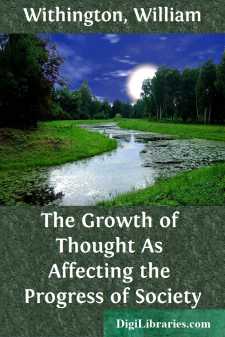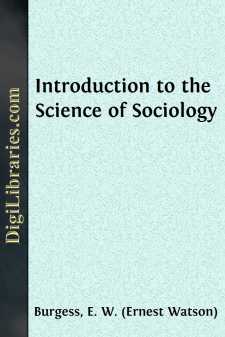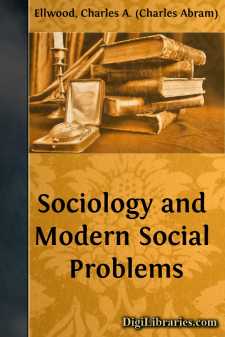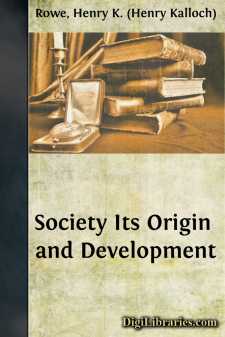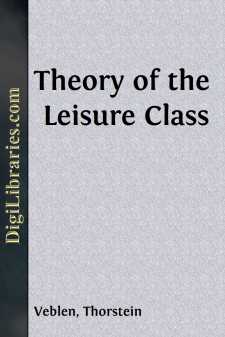Social Science
- Americana 1
- Anthropology 4
- Archaeology 7
- Criminology 2
- Emigration & Immigration 2
- Folklore & Mythology 46
- General 1
- Slavery 10
- Sociology
- Sociology of Religion 1
Sociology Books
Sort by:
by:
Patrick Geddes
INTRODUCTION This department of sociological studies should evidently be, as far as possible, concrete in treatment. If it is to appeal to practical men and civic workers, it is important that the methods advocated for the systematic study of cities, and as underlying fruitful action, be not merely the product of the study, but rather be those which may be acquired in course of local observation and...
more...
Introductory. The meditation on human life—on the contrast between what is, and what might be, on supposing a general concurrence to make the best of things-yields emotions both painful and pleasing;—painful for the demonstrations every where presented, of a love of darkness, rather than light; pleasing, that the worst evils are seen to be so remediable; and so clear the proofs of a gradual, but...
more...
INTRODUCTION The church and the school are the eyes of the country community. They serve during the early development of the community as means of intelligence and help to develop the social consciousness, as well as to connect the life within the community with the world outside. They express intelligence and feeling. But when the community has come to middle life, even though it be normally...
more...
by:
Ralph Adams Cram
I A WORLD AT THE CROSSROADS For two thousand years Christianity has been an operative force in the world; for more than a century democracy has been the controlling influence in the public affairs of Europe and the Americas; for two generations education, free, general and comprehensive, has been the rule in the West. Wealth incomparable, scientific achievements unexampled in their number and...
more...
PREFACE The materials upon which this book is based have been collected from a wide range of sources and represent the observation and reflection of men who have seen life from very different points of view. This was necessary in order to bring into the perspective of a single volume the whole wide range of social organization and human life which is the subject-matter of a science of society. At the...
more...
by:
Eliot Gregory
There existed formerly, in diplomatic circles, a curious custom, since fallen into disuse, entitled the Pêle Mêle, contrived doubtless by some distracted Master of Ceremonies to quell the endless jealousies and quarrels for precedence between courtiers and diplomatists of contending pretensions. Under this rule no rank was recognized, each person being allowed at banquet, fête, or other public...
more...
CHAPTER I THE STUDY OF SOCIETY What is Society?—Perhaps the great question which sociology seeks to answer is this question which we have put at the beginning. Just as biology seeks to answer the question "What is life?"; zoölogy, "What is an animal?"; botany, "What is a plant?"; so sociology seeks to answer the question "What is society?" or perhaps better, "What...
more...
CHAPTER I SCOPE OF ANTHROPOLOGY In this chapter I propose to say something, firstly, about the ideal scope of anthropology; secondly, about its ideal limitations; and, thirdly and lastly, about its actual relations to existing studies. In other words, I shall examine the extent of its claim, and then go on to examine how that claim, under modern conditions of science and education, is to be made good....
more...
CHARACTERISTICS OF SOCIAL LIFE 1. Man and His Social Relations.—A study of society starts with the obvious fact that human beings live together. The hermit is abnormal. However far back we go in the process of human evolution we find the existence of social relations, and sociability seems a quality ingrained in human nature. Every individual has his own personality that belongs to him apart from...
more...
by:
Thorstein Veblen
Chapter One ~~ Introductory The institution of a leisure class is found in its best development at the higher stages of the barbarian culture; as, for instance, in feudal Europe or feudal Japan. In such communities the distinction between classes is very rigorously observed; and the feature of most striking economic significance in these class differences is the distinction maintained between the...
more...


